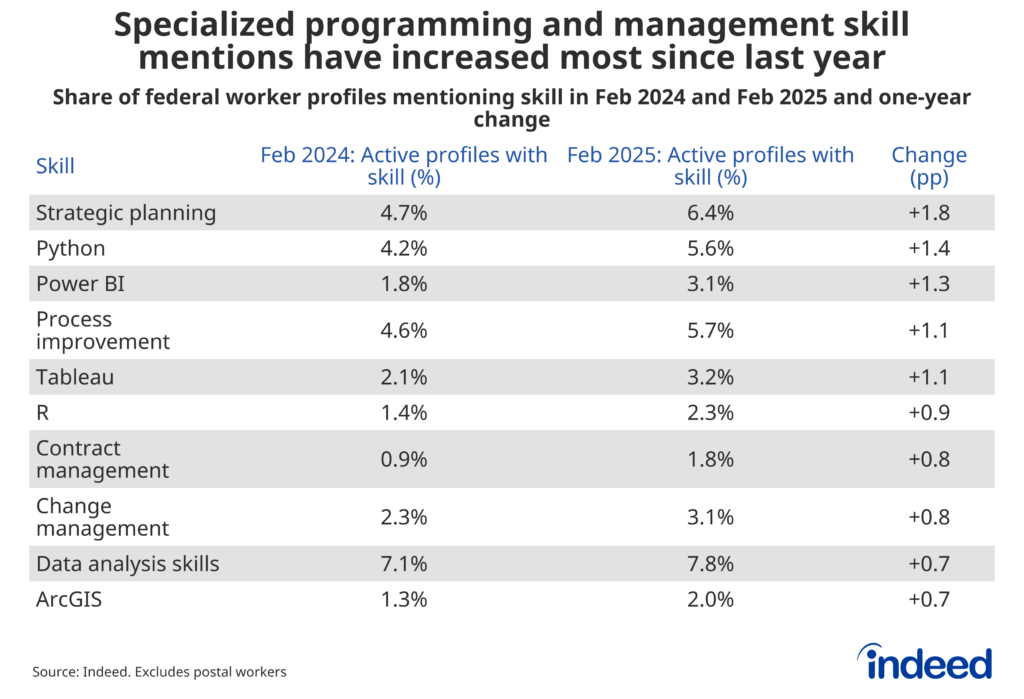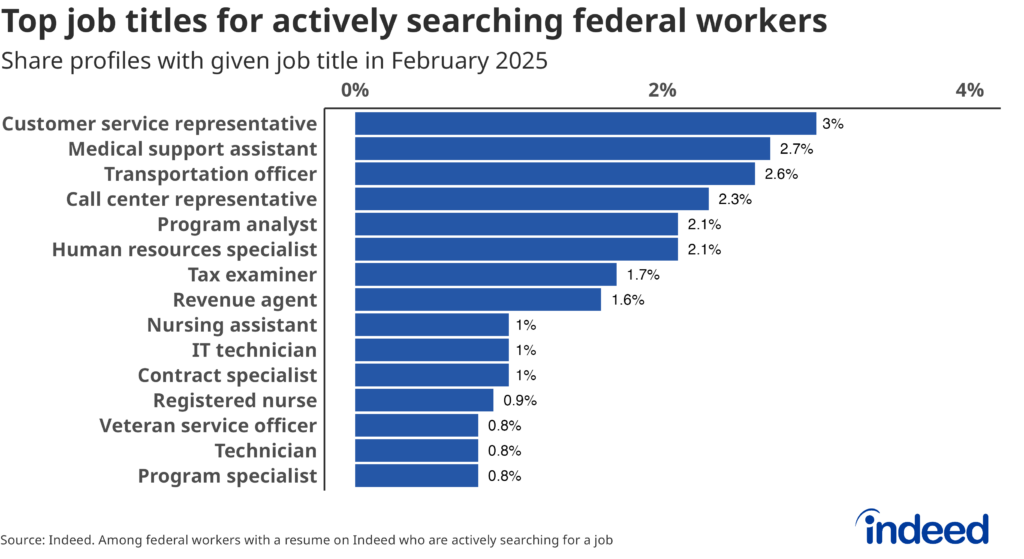Key Points:
- Almost 70% of federal workers with an active job search in February 2025 held a bachelor’s degree or above.
- Job seekers with federal experience were much more likely to list specialized soft skills, programming languages, and data analysis tools — including strategic planning, Python, Power BI, and Tableau — than those government workers searching last year.
- Healthcare and nursing, customer service, and other knowledge-based roles were typical job titles among those federal workers seeking new roles in February.
Editor’s Note: This article is part of a series examining how US federal workers are responding to ongoing efforts to shrink the size of the federal government. Find out more about the surge in job search activity by federal workers here, and read about government employees’ demographics and skills here.
As the Trump administration continues its efforts to shrink the size of the federal government and workforce, under the direction of the Department of Government Efficiency (DOGE), more impacted and displaced federal workers are starting new job searches. This spike in federal workers actively seeking new opportunities on Indeed is being driven in large part by more-educated and/or more-technically skilled workers than usual.
The share of federal workers with at least a four-year college degree who are currently seeking a new role is larger than it was a year ago, according to a Hiring Lab analysis of federal worker profiles and job search activity on Indeed. So is the share of those job seekers with specialized skills, including technical programming and data analysis. While it will take some time to know how successful these job search efforts are, data show that these educated job seekers will likely face challenges entering a labor market where opportunities for knowledge workers have faded in recent years.
Nearly 70% of actively searching federal workers have a bachelor’s degree or above
Federal workers are highly educated in general. A majority of federal workers (53.5%) held a bachelor’s or advanced degree in 2024, according to the federal Office of Personnel Management (OPM), compared to about 45% of employed Americans overall. Among those federal workers actively searching for a job in February 2024, approximately 56% held a bachelor’s degree or above — an expected baseline roughly in line with OPM estimates.
But in February 2025, more than two-thirds (68%) of federal workers actively searching for a new role on Indeed had at least a bachelor’s degree. To clarify, this phenomenon does not show that more federal workers hold an advanced degree this year compared to last year. Instead, it shows that more federal workers with a degree are searching for new roles this year compared to last year. This increase likely reflects both the types of roles that are being displaced — namely, roles that may require more formal education — and the heightened fear of displacement amongst highly educated federal employees in particular.
An influx of highly educated workers into the active job seeker pool may be an opportunity for private-sector employers grappling with labor shortages and looking to hire hard-to-fill roles, not to mention for chronically understaffed state/local government agencies. But it also comes as overall demand for knowledge workers — including those with college degrees — remains subdued compared to pre-pandemic norms. In other words, these workers are entering the labor market at a time when fewer opportunities match their education and experience.
Computer-based skills are common on active federal worker profiles
Indeed job seeker profiles often include a list of skills, and federal workers are no exception. In February 2025, 86% of actively searching federal workers listed one or more competencies in their profile, and the median number of skills listed was 13. An analysis of the most frequently mentioned competencies listed by those federal workers actively searching last month shows they held a mix of soft and hard skills skewed toward computer-based tasks.
To gain insight into how the pool of actively searching federal workers has shifted over the past year, we also analyzed how the skills most commonly listed by active federal workers changed between February 2024 and February 2025. This year, federal job seekers were much more likely to list specialized soft skills, programming languages, and data analysis tools — including strategic planning, Python, Power BI, and Tableau — than those government workers searching last year. While many of these are found in only a small portion of profiles from active job seekers, their growth aligns with the shift in education data. Both show that the type of federal workers looking for jobs has shifted since February 2024.

Healthcare & customer service workers are well-represented among federal workers searching for jobs
Federal employees actively searching for work (or those laid off recently) have a wide variety of jobs. In February 2025, the list of most common current job titles ranged from customer service representative, with 3% of all active profiles, to tax-focused roles, including tax examiner and revenue agent (1.7% and 1.6% of active job seekers, respectively). Healthcare and nursing, customer service, and other knowledge-based roles were also typical among those federal workers seeking new roles in February.

Notably, three of the top five jobs (including medical support assistant, customer service representative, and call center representative) are roles focused on helping people access government services or healthcare. Many workers in these roles may be actively searching for new jobs directly in response to Trump administration actions. But it’s also possible these roles may have generally higher turnover rates and more workers who are “always on” and looking for their next opportunity. Additionally, it’s also possible that the broad categories of “customer service representative” and “call service representative” landed at the top of the list because they encompass many everyday tasks (and/or are roles with less room for nuanced titles in the same way as a nurse or software developer).
Conclusion
The Trump administration has made shrinking the size of the federal government and workforce a major priority, and every day, more federal agencies and workers are coming under review or being displaced as part of these efforts. And a growing number of highly educated and specialized federal workers are actively seeking new opportunities. Indeed data shows that job applications are surging most from workers in those agencies that have received early scrutiny by DOGE, suggesting a strong worker reaction to these policies. Understanding the education and skills of those impacted workers currently seeking new roles — and matching that with a view of the kinds of jobs actually available to fill nationwide — can provide insight into the ultimate likelihood of these workers finding new jobs soon.
Methodology
On data privacy: To protect workers’ personal information, all datasets are stripped of identifying information, including names and addresses. Results are only reported in an aggregated format. Analysis and data review are also performed to ensure that data points cannot be tied back to individuals.
For this analysis, we utilized Indeed’s pool of hundreds of millions of job seeker profiles to identify active job seekers who listed the federal government as their current or (newly) former employer. We then grouped them by their highest listed education level, skills, job titles, and current/former department or agency. United States Postal Service workers were excluded to allow for comparisons with Office of Personnel Management and Bureau of Labor Statistics data.
Application data is based on the number of workers who started an application on Indeed, regardless of whether they saw the process through. Search data is based on phrases used by job seekers with an Indeed profile only. Time series data are seasonally adjusted to provide a clearer look at the trends. US searches on Indeed included queries on both the desktop and mobile versions of Indeed.
Data on seasonally adjusted Indeed job postings are an index of the number of job postings on a given day, using a seven-day trailing average. February 1, 2020, is our pre-pandemic baseline, so the index is set to 100 on that day. Data for several dates in 2021 and 2022 are missing and were interpolated.
The number of job postings on Indeed.com, whether related to paid or unpaid job solicitations, is not indicative of potential revenue or earnings of Indeed, which comprises a significant percentage of the HR Technology segment of its parent company, Recruit Holdings Co., Ltd. Job posting numbers are provided for information purposes only and should not be viewed as an indicator of performance of Indeed or Recruit. Please refer to the Recruit Holdings investor relations website and regulatory filings in Japan for more detailed information on revenue generation by Recruit’s HR Technology segment.
